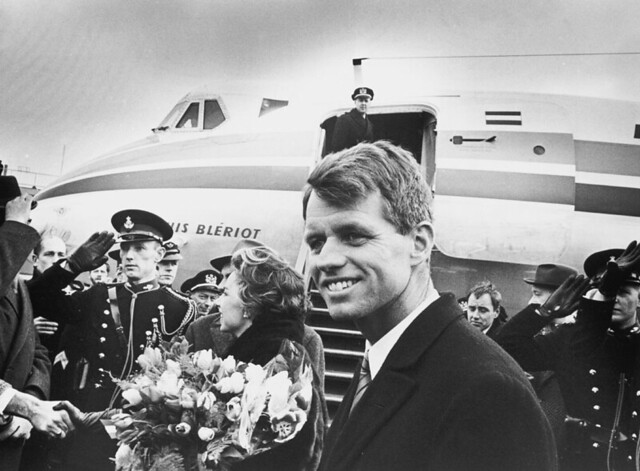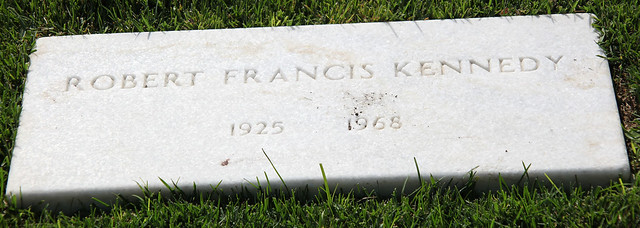Image courtesy of IISG's Flickr page - 02-26-1962_18565 Robert Kennedy: https://www.flickr.com/photos/iisg/4334944453/in/photolist-7B4HXB-Rpfs7o-c7QMMC-9rWDwT-4kGsXM-btwFRL-4VoAjU-oa1r4G-a4sM4W-ecH94n-26TCyuE-RQrSw4-c7QMPG-8MsMh-bnfxYb-KDdVJW-A1FPaL-nEG1hy-R4oGFq-rnR424-RrWuVB-R4oGpd-dAY2Fe-Jca8GF-nGJE1T-Rpfv6u-RCKA5p-Qp1Nz4-Qp1N8x-Qmc6hb-59VMK8-dAY2ot-dB4tKo-cWnD4Q-4GgbAq-VdcFY3-6TMv4j-5sjRFD-8wARje-ogbc2K-fbgTWr-b8hjsz-b5kBCr-vskryf-4716rf-nwu2Ji-4U5UPJ-4U1FRK-23cuvWr-jxXvkZ
Creative Commons License: https://creativecommons.org/licenses/by-sa/2.0/
"It is from numberless diverse acts of courage and belief that human history is shaped. Each time a man stands up for an ideal, or acts to improve the lot of others, or strikes out against injustice, he sends forth a tiny ripple of hope, and crossing each other from a million different centers of energy and daring those ripples build a current which can sweep down the mightiest walls of oppression and resistance."
"Ripple of Hope" speech by RFK, delivered at the University of Cape Town, June 6, 1964
It was half a century ago on this day that Robert F. Kennedy died.
Technically, he was shot on the evening of June 5th, although he survived until the next day. That made it a bit complicated as to when it would be most appropriate to honor the man with a blog entry in his memory, although there never was a question that I intended to do that.
Ultimately, I opted for June 6th for a couple of reasons. Firstly, that was the day when he actually died from the wounds sustained from being shot by Sirhan Sirhan the night before. Secondly, RFK delivered what is likely his most famous speech, the "Ripple of Hope" speech, in Cape Town, South Africa, on June 6 in 1964, four years to the day before his life would be prematurely cut short.
The visit to South Africa by RFK came during the height of the apartheid days, and so his speech had a particularly profound impact. At the time that I first learned about it, I myself was quite taken by the situation in South Africa, which still had the apartheid system in place at the time. One of the things about South Africa that always struck me were the parallels between it and the Unite States. I was amazed at some of the similarities, from history to geography to the problems facing it regarding racism, to the tendency to be far more conservative, even extremist on some levels, than other countries were. So, when I came across a little clip of RFK's speech that jokingly referred to the similarities, it really resonated:
"I come here this evening because of my deep interest and affection for a land settled by the Dutch in the mid-seventeenth century, then taken over by the British, and at last independent; a land in which the native inhabitants were at first subdued, but relations with whom remain a problem to this day; a land which defined itself on a hostile frontier; a land which has tamed rich natural resources through the energetic application of modern technology; a land which was once the importer of slaves, and now must struggle to wipe out the last traces of that former bondage. I refer, of course, to the United States of America."
It might have been risky, at the time, to compare the United States to South Africa, given the tendency to see the apartheid system as the most extreme form of legalized racism then in existence. However, this was 1964, and remember that that was the year when legalized Jim Crow segregation finally came to an end in the United States. Maybe the Jim Crow segregation was not quite as heavy handed as apartheid in South Africa was, with the pass books and the late night raids on slum homes and the relocations of millions of people, but it was still an unsavory and, frankly, embarrassing distinction that the United States, which bills itself as the "home of the free," had to endure, and in fact, still has to endure. That kind of legacy does not simply disappear overnight. And Kennedy comparing the United States to South Africa was apropos, because the similarities were indeed there. Maybe a lot of Americans might not have felt flattered by the comparisons, and perhaps it even angered some. Yet, it needed to be said, for several reasons. First of all, Americans needed to wake up to just how unfair and inconsistent with the lofty notions of freedom legalized racism was. Also, we need to understand that we are not alone in this world, that we can learn things from the examples of other countries, something that I think Americans could use reminders of and benefit more from today, as well.
RFK was willing to push the envelope, and his visit to South Africa had a lasting effect that transcended a typical politicians visit to another country. In fact, it is still remembered to this day, in both countries, and deservedly so. It was also during this visit that he showed that ability to push the envelope with humor, and in a manner that inspires rather than repulses. These were some of the qualities that gave his bid for the presidency some life, to the point that many feel he was not only well on his way to securing the Democratic nomination that year, but indeed, that he likely would have gone on to be elected to the White House.
I cannot speak about that. There are people who I know who lived during those times, well before I was born, and who are sure that RFK would have become president. But there are plenty of people who feel that Nixon would have won, anyway. And even if RFK had won the White House, what would his presidency have looked like? Would it have been successful? Might it have possessed some of that Kennedy magic that had worked so well during the days of Camelot, when his brother had been in the Oval Office, and when RFK himself had been Attorney General? Would he be regarded in the same generally positive light as his brother's presidency was, or would it have been torn by the tensions that existed in the nation at the time?
None of those questions can be fully answered. At least not by me. Events happen, and become part of history. History can be interpreted, and indeed, that interpretation can be all important. Can, in fact, help define the present. Maybe had RFK indeed won the election and taken the White House, American history might have been different, and maybe the country would look very different today.
All of that is speculative. There is no way of knowing, really.
But we can take a measure of what we lost on this day, 50 years ago. RFK was one of the greats, with that Kennedy ability to use words to inspire people, to inspire a nation. On many levels, he represented the best that this country had to offer, and whatever might have been in store for him in the future will never be known, because a mad man with a gun put an to the man, and thus an end to the dream.
However, we can remember, and should remember. The nation was divided then, much like it is now. We do not precisely have an RFK at the moment. Yet, we can remember his words and his vision. We can remember how he told us about what a ripple of hope can do, and how far it can travel, and how each of us has that ability to make that ripple.
Let us remember...
None of those questions can be fully answered. At least not by me. Events happen, and become part of history. History can be interpreted, and indeed, that interpretation can be all important. Can, in fact, help define the present. Maybe had RFK indeed won the election and taken the White House, American history might have been different, and maybe the country would look very different today.
All of that is speculative. There is no way of knowing, really.
But we can take a measure of what we lost on this day, 50 years ago. RFK was one of the greats, with that Kennedy ability to use words to inspire people, to inspire a nation. On many levels, he represented the best that this country had to offer, and whatever might have been in store for him in the future will never be known, because a mad man with a gun put an to the man, and thus an end to the dream.
However, we can remember, and should remember. The nation was divided then, much like it is now. We do not precisely have an RFK at the moment. Yet, we can remember his words and his vision. We can remember how he told us about what a ripple of hope can do, and how far it can travel, and how each of us has that ability to make that ripple.
Let us remember...
Image courtesy of Tim Evanson's Flickr page - Headstone - Robert F Kennedy Grave Site - Arlington National Cemetery - 2012-05-19: https://www.flickr.com/photos/timevanson/7297343508/in/photolist-c7QMZo-c7QMT5-c7QMEd-bd1MuT-bd1xRn-bcZiva-bcZhXt-bcZhzD-bcZhqg-bcYqSM-aXN81B-aXN2Ni-9kasot-7EjFZX-6LdvCT-6hnfgo-HBS3PR-HFaYiN-GLvExn-HvgTPG-GjJb2A-Dch8ys-E1KvUR-E1KmPB-DGSA4A-Ck8EmC-CTEwTL-CB78u9-BQHRhm-tF6dsZ-uBWb1z-i4B7cv-fKNdMH-fbikRD-e2Bqut-e2BqkD-dB4uaw-cqfVCb-cgEdMG-c7K88b-bZhKf1-bZhHz5-bXbvb1-bXbfRf-bXb859-bXaAMJ-bXayRs-areTvQ-9YpQxg-9YsKAq
Creative Commons License: https://creativecommons.org/licenses/by-sa/2.0/
Creative Commons License: https://creativecommons.org/licenses/by-sa/2.0/


No comments:
Post a Comment